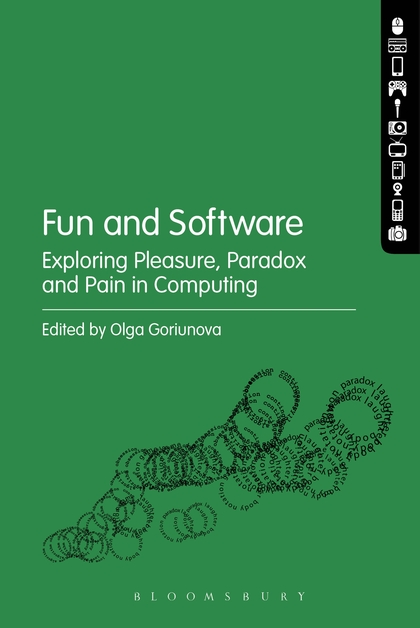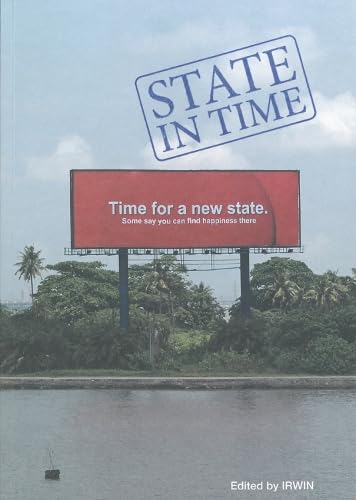Olga Goriunova (ed.): Fun and Software: Exploring Pleasure, Paradox and Pain in Computing (2014)
Filed under book | Tags: · abstraction, aesthetics, affect, algorithm, art, body, code, computing, game, humour, labour, logic, media, media theory, politics, programming, software, software art, software studies, theory, time

“Fun and Software offers the untold story of fun as constitutive of the culture and aesthetics of computing. Fun in computing is a mode of thinking, making and experiencing. It invokes and convolutes the question of rationalism and logical reason, addresses the sensibilities and experience of computation and attests to its creative drives. By exploring topics as diverse as the pleasure and pain of the programmer, geek wit, affects of play and coding as a bodily pursuit of the unique in recursive structures, Fun and Software helps construct a different point of entry to the understanding of software as culture. Fun is a form of production that touches on the foundations of formal logic and precise notation as well as rhetoric, exhibiting connections between computing and paradox, politics and aesthetics. From the formation of the discipline of programming as an outgrowth of pure mathematics to its manifestation in contemporary and contradictory forms such as gaming, data analysis and art, fun is a powerful force that continues to shape our life with software as it becomes the key mechanism of contemporary society.”
Texts by Andrew Goffey, Simon Yuill, Matthew Fuller, Luciana Parisi and M. Beatrice Fazi, Adrian Mackenzie, Michael Murtaugh, Geoff Cox and Alex McLean, Wendy Hui Kyong Chun and Andrew Lison, Christian Ulrik Andersen, Brigitte Kaltenbacher, Annet Dekker, and Olga Goriunova.
Publisher Bloomsbury, New York and London, 2014
New Media and Technology series
ISBN 1623560942, 9781623560942
285 pages
Software studies page on Monoskop
Comment (0)Grey Room 29: New German Media Theory (2007)
Filed under journal | Tags: · aesthetics, body, code, communication, computing, cultural techniques, cybernetics, information aesthetics, law, media, media studies, media theory, mediality, technology, theory, writing

“If asked for a definition of ‘media,’ the answer given by the authors included in this volume would likely be ‘Es gibt keine Medien’–‘There are no media.’ In 1993, Friedrich Kittler published the essay ‘There Is No Software.’ Three years later, Bernhard Siegert attacked one of the fetishes of the burgeoning German media studies of the 1990s by declaring that ‘There are no mass media.’ Such a dismissal of some of the core concepts of media studies–including any fixed concept of ‘media’ itself may well be the signature of the type of ‘new media theory’ presented by the modest collection of essays in this volume.” (from the Introduction)
With contributions by Eva Horn, Joseph Vogl, Bernhard Siegert, Philipp Sarasin, Herta Wolf, Cornelia Vismann and Markus Krajewski, and Claus Pias.
Edited by Eva Horn
Publisher MIT Press, Fall 2007
ISSN 1526-3819
133 pages
Es gibt kein PDF (removed on 2014-11-15 upon request of the publisher)
Comment (0)IRWIN (ed.): State in Time (2014)
Filed under book | Tags: · aesthetics, appropriation, art, art theory, contemporary art, politics, retro-avant-garde, theory, utopia

“The NSK State in Time emerged in 1992, evolving in the context of the dissolution of Yugoslavia and the transformation Neue Slowenische Kunst. Existing both as an artwork and a social formation, a state that encompasses all time but holding no territory, the NSK State in Time has for two decades pushed the boundaries of artistic and political practice. This volume collects together, for the first time, analyses of the NSK State in Time including its relationship with the changing context of Eastern Europe, the connection between aesthetics and the state, the rise of NSK folk art, and documents the First NSK Citizen’s Congress in 2010.”
Includes essays by Inke Arns, Huang Chien-Hung, Eda Čufer, Marina Gržinić, Irwin, Tomaz Mastnak, Viktor Misiano, Alexei Monroe, Ian Parker, Avi Pitchon, Stevphen Shukaitis, Slavoj Žižek, and Jonah Westerman.
Publisher Minor Compositions, Wivenhoe / New York / Port Watson, 2014
Open Access
ISBN 9781570272769
178 pages

